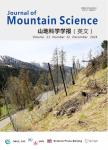Residents'environmental conservation behaviour in the mountain tourism destinations in China:Case studies of Jiuzhaigou and Mount Qingcheng
Residents' environmental conservation behaviour in the mountain tourism destinations in China: Case studies of Jiuzhaigou and Mount Qingcheng作者机构:guangzhou institute of geographyGuangzhou 510070China guangdong open laboratory of geospatial information technology and applicationGuangzhou 510070China school of geographic and oceanographic sciencenanjing universityNanjing 210046China shenzhen tourism collegejinan universityShenzhen 518053China school of history culture and tourismjiangsu normal universityJiangsu Normal UniversityXuzhou 221116China school of architecturestate key laboratory of subtropical building sciencesouth china university of technologyGuangzhou 510641China
出 版 物:《Journal of Mountain Science》 (山地科学学报(英文))
年 卷 期:2017年第14卷第12期
页 面:2555-2567页
核心收录:
学科分类:12[管理学] 1204[管理学-公共管理] 02[经济学] 0202[经济学-应用经济学] 020202[经济学-区域经济学]
基 金:supported by the National Natural Science Foundation of China(Grant Nos.41501147,41661034,41671130) The Scientific Platform and Innovation Capability Construction Program of GDAS(Grant No.2016GDASPT-0210) GDAS'Special Project of Science and Technology Development under Grant(Grant No.2017GDAs CX-080) the Guangdong Provincial Natural Science Foundation(Grant No.2017A030310475)
主 题:Sustainable tourism development Mountain attachment Environmental Conservation Behaviour Environmental values Cognitive Behaviour Theory
摘 要:This study aimed at gaining an understanding of the formation of residents Environmental Conservation Behaviour(ECB) to promote sustainable tourism development in Chinese mountain areas. In particular, a theoretical framework was constructed by merging residents mountain attachment and their environmental values,and awareness of environmental consequences based on the Cognition Behaviour Theory. This research sampled 642 residents with convenience sampling method in Jiuzhaigou and Mount Qingcheng, and structural equation modelling analysis was conducted to identify the relationships among the above variables. Results verified that mountain attachment affected people s awareness of environmental consequences, which then affected their *** values and mountain attachment directly and positively influenced ECB. Moreover,awareness of environmental consequences played the most prominent role in predicting ECB among all the predictors in this study. In all, this study derived several significant implications which can not only contribute to environmental management policies in tourism field but also help to improve the levels of the antecedents of residents ECB and promote sustainable tourism development in Chinese mountain areas.



